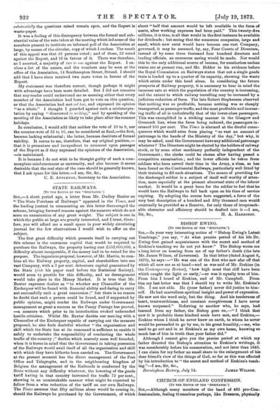BISHOP EWING.
[TO THE EDITOR OF THE "SPECTATOR."] SIR,--In your very interesting notice of "Bishop Ewing's Latest Teachings," you say, "At what precise period of his life Dr._ Ewing first gained acquaintance with the secret and method of Erskine's teaching we do not yet know." The Bishop wrote me a long letter on hearing from me of my father's death (the late- Mr. James Wilson, of Inverness). In that letter (dated August 8,. 1870), he says :—" He was one of the first who saw afar off that which all now see as at hand—and as was said of Mr. Erskine (in the Contemporary Review), how high must that cliff have been. which caught the light so early,'—so was it equally true of him. From him I heard of Erskine, and of Mr. Campbell. From. him my last letter was that I should try to write Mr. Erskine's- life. I am not able. He (your father) never did justice to him- self. He had marvellous spiritual insight and power of expression. He saw not the word only, but the thing. And his tenderness of heart, trustworthiness, and constant receptiveness I have never known surpassed." Referring to another who, he says, had learned from my father, the Bishop goes on,—" I think that now it is probable these kindred souls have met, and Erskine,— Erskine whom I think he never knew on earth, to whom he never- would be persuaded to go by me, in his great humility,—me, who. used to go out and in at Erskine's as my own home, knowing so, much lees of him in truth than your father did."
Although I cannot give you the precise period at which my father directed the Bishop's attention to Erskine's writings, it- was considerably before his consecration, and not later than 1840. I can claim for my father no small share in the enlargement of his dear friend's view of the things of God, so far as this was effected by his introduction to "the secret and method of Erskine's teach- ing."—I em, Sir, &c.,


































 Previous page
Previous page